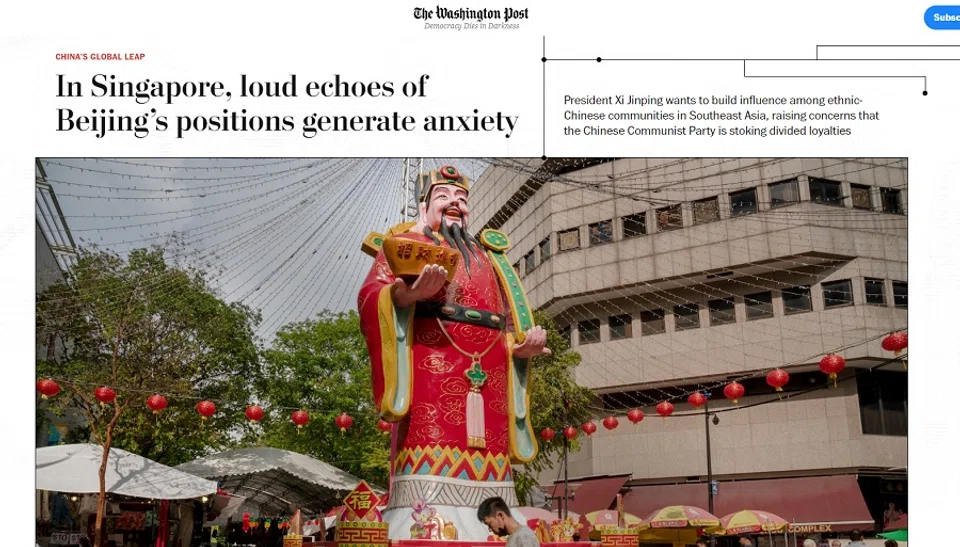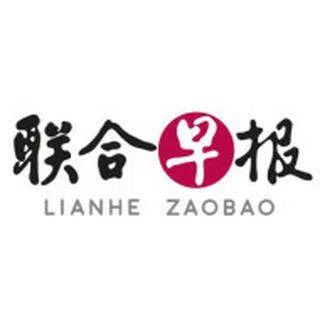Lianhe Zaobao's response to The Washington Post's article
On 24 July, The Washington Post published a feature article titled "In Singapore, Loud Echoes of Beijing's Positions Generate Anxiety", in which some comments were made about Lianhe Zaobao. Here is Lianhe Zaobao's response to the article.

The Washington Post's feature article "In Singapore, Loud Echoes of Beijing's Positions Generate Anxiety" (published on 24 July) made biased comments and unfair statements about Lianhe Zaobao, based on its journalistic perspective and approach on pre-established perspectives and agendas, and presented its materials and arguments as such. This is unfortunate.
Lianhe Zaobao is a Singapore news media with an eye on the Asia-Pacific region and the world. We strive to provide fair and balanced reporting, and in doing so draw extensively from international news sources and the first-hand reports of our correspondents and writers in Beijing, Shanghai, Chongqing, Guangzhou/Shenzhen, Taipei, Hong Kong, Tokyo, Seoul and Kuala Lumpur who track regional developments and major power diplomacy. Our publication also features articles with diverse perspectives.
We had earlier provided comprehensive responses to the questions raised by The Washington Post, which were not adequately reflected in their reporting.
Lianhe Zaobao takes its mission of delivering information seriously and remains committed to neutrality. Our reporting features viewpoints from China and the West, including policy statements from officials, analyses from academics, media coverage and commentaries. In fact, we extensively quote and use information from international news agencies and commentaries to offer our readers and audiences broad, diverse, and sometimes opposing perspectives and information.
As a Singapore news media, Lianhe Zaobao takes in Chinese and Western viewpoints while preserving our unique stance and independence. Lianhe Zaobao has had an online presence in mainland China for nearly 30 years, making efforts to provide Chinese audiences with international information and perspectives that may not be covered by domestic media. Lianhe Zaobao has also experienced several periods of prolonged blocks.
The Washington Post has selectively left out some facts while intentionally highlighting and putting together some information, and citing anonymous former and current journalists to paint a negative image of Lianhe Zaobao, which is regrettable but not surprising to us. Amid the current international geopolitical situation, the idea that "if you are not with us, you are against us" is spreading. Now more than ever, Lianhe Zaobao believes that we should not be pressured by anyone into changing our editorial direction. We remain committed to staying objective; we will not be pressured by any party, and do not wish to be embroiled in China-US rivalry.
Below are the complete set of questions raised by the Washington Post to Lianhe Zaobao for this story and our responses in full:
Q1. How does Lianhe Zaobao select opinion columnists for the newspaper? Can you confirm that regular columnists are paid?
Q2. The Washington Post has found that two regular columnists, Ding Song Quan and Deng Qingbo are both Communist Party officials. Ding is part of Zhejiang province's Department of Education, where he was the deputy editor-in-chief of their official newspapers and periodicals. He doesn't just teach at Huzhou College, but is also part of the Chinese Communist Party committee of that school. Deng Qingbo, meanwhile, is the director of the online propaganda and comment division of the Hunan Provincial Party Committee's Cyberspace Administration Office. Why have both these writers been described as China affairs commentators, without their Communist Party affiliation? Were their full positions not known by Zaobao's editorial leadership? Have the two been paid by Zaobao for their opinion contributions?
LHZB: Lianhe Zaobao's official position is only carried in its editorials. Lianhe Zaobao aims to feature a broad spectrum of views in the Forum Opinion section, including those approving of the Chinese approach and articles criticising it. The contributors of these articles include academics and experts from the US and Japan, as well as those from China; we do not want to discard certain views out of hand solely based on the columnist's background. These pieces do not represent Lianhe Zaobao's views. Given that China is the largest trading partner of most countries in this region, understanding the thinking of the authorities in Beijing has its value. In the CCP's "whole nation" system, so-called private agencies or individuals may often have an official background - this is well known among observers of modern China. The Washington Post has also published interviews of academics reflecting the official position, also without indicating their partisanship. As far as possible, Lianhe Zaobao verifies the background of all writers, while respecting how they wish to describe themselves. Lianhe Zaobao also publishes writers from China who prefer to publish anonymously or under a pseudonym due to their contradictory positions on sensitive issues from the Chinese government. There is a modest fee for published articles, which is the practice for Chinese-language newspapers in Singapore.
Q3. The Washington Post did a data analysis of Zaobao's articles on topics like Taiwan, protests in China and Hong Kong, Xinjiang and other topics, covering all articles published in 2022 on those specific topics. We noted that overall, Zaobao references, cites and publishes pro-CCP or state sources more than any other sources, including independent media. For example, Zaobao most often on these topics republished stories from China Times and United Daily News, both pro-CCP Taiwanese newspapers. Further, we analyzed the coverage of the recent 'blank paper' protests in China and found the first articles all referencing Chinese state sources, without further context, including repeating the state narrative of the cause of the Urumqi fire. At least 9 stories mentioned "foreign interference" accusations in the protests, without providing a contrasting view. Interviews with reporters and former reporters for Zaobao have indicated that Zaobao isn't incentivized to provide a more balanced view, as to not offend the reader base. Others have said that there is a practice for standing up or having more neutral/balanced reports on issues core to Singapore, but then letting Beijing's narrative run on topics that are not considered as core to Singapore. It would be good to have a response to these questions as well.
LHZB: All our journalists and editors working on China reporting are proficient in both English and Chinese languages and we obtain our information from a great variety of sources. As a result, besides Chinese sources, we also cite or quote a lot from international news agencies and Western mainstream media reports on mainland China, Hong Kong and Taiwan. When we report on China or any location, official local data and information is the primary source. Reports on Taiwan are usually filed by our correspondents based there; when quoting from other media, we do not intentionally select the sources according to their political leanings. When we report on China, the principle is to concurrently report what China and other countries are saying, on the premise that the information sources are reliable, or that we have first-hand interviews. The narrative we are after is not the Western narrative or Beijing's narrative, but a Singapore media's narrative. And for that, we have also been strongly criticised by pro-China or anti-China readers. But this will not deter us from our fundamental intentions.
Q4. Reporters have suggested that the new Chinese ambassador, Sun Haiyan, has been quite strong and vocal in asking media across Singapore to help tell positive stories of China. Has Zaobao pushed back against this? Have their been instances where Zaobao has declined to run op-ed pieces or letters from her?
LHZB: Quite a number of ambassadors have been engaging us, including China's ambassador. We interviewed them and published articles contributed by them. The latest was from the Japanese ambassador. Last November, Ambassador Sun sent one in response to our editor-in-chief's column. We published that by our guiding principle of giving the right of reply.
Q5. Does Zaobao factor its access in China in its editorial decisions in Singapore?
LHZB: Based on the definitions of some Western media platforms, if you're not anti-China, you must be pro-China. And in their eyes, you're not only pro-China, but pro-CCP. Such perceptions and definitions are too simplistic and even malicious. We cover China news as we would other news - being objective, neutral, fact-based and without critique or preconceived notions. Indeed, we may not be dancing to the West's tune when we report on certain topics. But to categorise us as a pro-CCP media because of this seems to be overly rash and arbitrary.
We have millions of readers in China who visit our digital platforms because the perspective and interpretation of our reports are different from that of the local Chinese media outlets. We cherish these readers because to them, we are an important window for them to connect to the outside world. And we have never taken the fact that they are able to access our platform for granted. The reason why Lianhe Zaobao reports or does not report news is not dependent on whether we will be blocked in China. We also do not exist to oppose or support China, nor to oppose or support any country. Our mission is to bring informative and quality information to our readers, and to provide a broad spectrum of views.
The objective fact is that there are instances where our users in mainland China cannot access particular reports, or any report for that matter, but we maintain our usual stance. Amid intensifying China-US rivalry, we stick to the principle of not taking sides and refuse to be forced into taking sides under pressure.
Q6. I Would like to have your comment on your partnership with Sensetime, which has been sanctioned by the US government because of alleged complicity in human rights abuses against the Uyghur minority.
LHZB: The one-year non-binding arrangement between Lianhe Zaobao and SenseTime International is designed to explore ways of using AI technology to improve visual content presentation and user experience. This is part of our digitisation journey where we develop digital innovations with a broad range of content, media and technology partners. Lianhe Zaobao has no wish to be embroiled in US-China contests.
This response was first published in Lianhe Zaobao as "新加坡《联合早报》对于美国《华盛顿邮报》针对本报长篇报道的回应".





